| Ron Jones Bio |
| CorporateWellness |
| Coach & Train |
| Exercise Library |
| Handouts |
| Health & Fitness |
| KETTLEBELLS |
| Products by RJ |
| Site Map |
Ankle Band: "Monster Walk"
Directions: Perform
Dynamic Warm-Up
exercises at “beginning” of workout
for maximum benefit and improvement.
Pick a safe level; never be unsafe or exceed your capacity to “control” your
body!
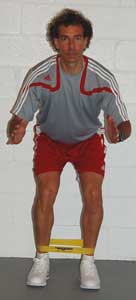
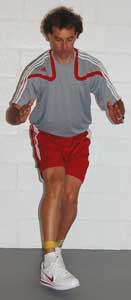
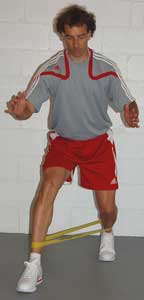
ç
Out & Over With My Right Leg
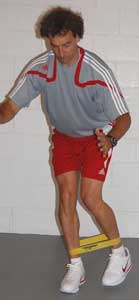
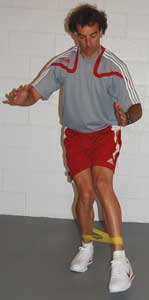
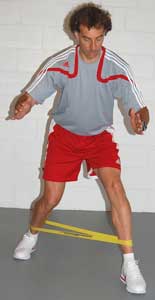
Out & Over With My Left Leg
è
OBJECTIVE: Increase hip stability/abductor
strength & increase knee stability.
-
Select correct band resistance color! From my experience, most people start with the green (medium). A few progress to the blue (heavy). Very few every use the black (extra heavy). The yellow (light) is usually too light to offer much benefit unless you are extremely detrained. *Note: If you over stretch the bands, and especially the yellow band, they can break. Purchase Ankle Bands Here
-
Secure ankle band directly above each ankle keeping the band "flat" to minimize pinpoint pressure on skin.
-
Separate feet slightly as you get into a semi-squat--also called the "athletic or ready" position. The ready position will load the glute medius hip stabilizers into a pre-stretch. Your feet should be square and flat.
-
While staying down low in the ready position, bring one leg out and forward then swing this leg out laterally to the side. You will "pull" the leg out to the side against the resistance of the stretched ankle band as you finish each step. This is an "arc-type" stepping motion. DO NOT use the back and tilt or pivot hips as you step!
-
Bring trail foot forward towards the lead leg then go right into the next step. Keep feet separately slightly during transition in order to maintain band tension. Do not allow band to get loose.
-
Repeat in the same direction for »8-10 yards. For an option, you can return by doing a "backwards" Monster Walk by just reversing the directions above.
-
A related hip stabilization exercise is the Lateral Band Walk.
![]() Tips: Stay LOW! The big mistake
people make is standing up then rocking back and forth as they pivot their
hips and allow all kinds of compensations to come into play. MAKE the
hip stabilizers and abductors do their job. Don't allow your low back
to take over--stay low and move the legs out from the hips only.
Amazingly, I've only seen one other trainer actually have their clients do
this exercise correctly! Most people don't stay low, compensate, and
therefore remove the hip stabilizer/glute medius challenge by getting
sloppy. Quality first--ALWAYS!
Tips: Stay LOW! The big mistake
people make is standing up then rocking back and forth as they pivot their
hips and allow all kinds of compensations to come into play. MAKE the
hip stabilizers and abductors do their job. Don't allow your low back
to take over--stay low and move the legs out from the hips only.
Amazingly, I've only seen one other trainer actually have their clients do
this exercise correctly! Most people don't stay low, compensate, and
therefore remove the hip stabilizer/glute medius challenge by getting
sloppy. Quality first--ALWAYS!
-
Numerous knee ACL injuries can be traced back to a weak glute medius hip stabilizer muscle which is the primary hip stabilizing muscle. The knee was not the problem as much as something higher up the chain of kinetic movement i.e. the hip stabilizers were too weak to keep the knee tracking in the correct position in the first place; thus, the knee had too much lateral force and failed. Western medicine will gladly repair your ACL and take your money, but if you're problem was poor hip stability in the first place, you still have NOT solved the problem! Band Walks are the best exercises I've found so far to isolate the hip stabilizers for maximum improvement. If your hips are on fire when doing band walks--then you're doing them correctly! If you want healthy knees--then do these exercises!
-
In addition to injury prevention, having more hip stability along with more efficient knee stabilization further down your chain of movement will minimize lateral force leaks. This means you won't spill out as much energy to the sides--you'll be able to direct your energy in the direction needed to move as fast as possible with minimal lateral deviations. Your knees will track cleanly. Your running will be more linear and straight line instead of your legs and knees flopping all over the place.
- How & Where To Buy Ankle Bands

For optimal performance & safety,
I use PerformBetter.Com ankle bands.
*Note:
These exercises are intended for "normal healthy"
individuals and many are only intended for competitive athletes.
If you have an injury, or abnormal pain is present, see your physician or a certified physical
therapist before continuing your exercises.
RonJones.Org | Back to BodyXercise Library | Site Map
(Updated 8.16.07)
